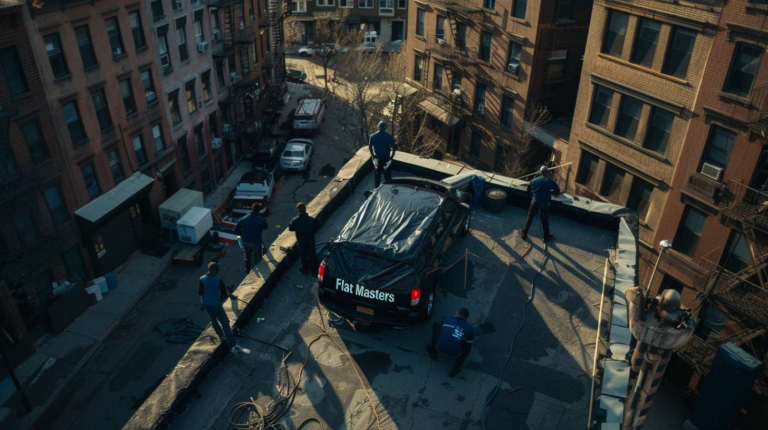Professional Flat Roof Leak Detection Services You Can Trust
Look, I've been chasing water through flat roofs in Queens for over two decades, and let me tell you something - flat roof leak detection isn't just about finding where the water's coming in. It's about understanding how water moves, where it hides, and why that wet spot on your ceiling might be coming from a hole twenty feet away from where you think it is.
Just last month we had a call on 31st Avenue in Astoria where the homeowner was convinced their leak was above the kitchen. Spent three hours up there with our thermal imaging equipment only to find the actual penetration near the HVAC unit on the opposite side of the building. Water had traveled under the membrane, through the insulation, and down along a structural beam before finally showing up in their kitchen ceiling.
How We Actually Find Leaks on Flat Roofs
Here's the thing about how to find leaks on a flat roof - most people think you just walk around looking for obvious holes or cracks. That's like trying to find a needle in a haystack while wearing a blindfold. Professional flat roof leak detection requires understanding the membrane system, the drainage patterns, and how water behaves on low-slope surfaces.
We use electronic leak detection equipment that can locate breaches in the membrane even when they're completely dry. This isn't some fancy gadget we bought to impress customers - it's essential equipment because visual inspection alone misses about 60% of actual leak sources.
The process starts with understanding your roof's history. When was it installed? What type of membrane? Has there been any recent work done up there? I can't tell you how many times we've found leaks that trace back to someone walking on the roof improperly or a contractor who didn't know what they were doing around penetrations.
Why Water Shows Up Where You Don't Expect It
Finding a leak on a flat roof means thinking like water. Water doesn't care about your property lines or your logic - it follows the path of least resistance. On flat roofs in Queens, especially older buildings, that path can be incredibly complex.
The insulation layer can channel water for surprising distances. We've traced leaks that originated at roof drains and showed up as interior damage fifty feet away. The membrane might be perfectly intact where you see the problem, but somewhere else - maybe around a vent penetration or where two membrane sections overlap - there's a breach letting water in.
Temperature changes make everything worse. The freeze-thaw cycles we get here in New York create expansion and contraction that opens up seams and cracks that might be perfectly sealed during moderate weather. That's why some leaks only show up during heavy rains or rapid temperature swings.
Professional Detection Methods That Actually Work
When people ask me how to detect flat roof leaks, I always start with the systematic approach. Visual inspection is step one, but it's just the beginning. We're looking for membrane damage, ponding areas, clogged drains, and signs of foot traffic or equipment damage.
Electronic leak detection comes next. This involves creating a low-voltage electrical field across the roof membrane and using specialized equipment to locate breaches. It sounds high-tech, but the principle is simple - intact membranes don't conduct electricity, but water and breaches do.
Thermal imaging is another tool we use regularly. Temperature differences can reveal moisture patterns, insulation problems, and areas where the membrane isn't performing correctly. On a sunny day after morning dew, the thermal signature can show exactly where moisture is collecting under the membrane.
Sometimes we use flood testing for small areas where we suspect problems. This involves temporarily damming a section of roof and filling it with water to see where leaks develop. It's not something you want to do without proper preparation and the right equipment.
The Real Challenge: Multiple Leak Sources
Here's what most people don't realize about how to find the source of a leak on a flat roof - there's often more than one. Flat roofs develop problems over time, and by the time you notice interior damage, there might be several membrane breaches contributing to the problem.
We had a warehouse job in Long Island City last year where the owner was getting water damage in three different areas inside the building. Turned out there were seven separate leak points, all interconnected by the way water was moving through the insulation layer. Fixing just the obvious ones would have left the customer with ongoing problems.
That's why proper flat roof leak detection requires comprehensive testing of the entire affected area, not just spot fixes where you see obvious problems.
When to Call Professional Flat Roof Leak Detectors
Look, I understand the temptation to try finding leak on flat roof issues yourself. You see a wet spot, you want to grab a ladder and take a look. But flat roof systems are more complex than they appear, and walking around on them without proper knowledge can create more problems than you solve.
Call professionals when you notice interior water damage, when you can see obvious membrane problems from the ground, or when you have recurring leak issues that seem to move around or come back after repairs.
Also call us before the problem becomes an emergency. Flat roof leaks don't get better on their own, and water damage inside your building gets expensive fast. The cost of professional leak detection is nothing compared to dealing with structural damage, mold issues, or ruined inventory.
What Makes Flat Masters NY Different
We've been specializing in flat roof systems in Queens since 2001. Our flat roof leak detector services aren't just about finding problems - we understand the local building codes, the climate challenges we face here, and the specific issues that affect different types of flat roof construction common in this area.
Our team uses professional-grade electronic leak detection equipment, thermal imaging cameras, and moisture meters. But more importantly, we have the experience to interpret what the equipment is telling us and develop repair strategies that address root causes, not just symptoms.
When we come out for leak detection, we're not just looking for the immediate problem. We're evaluating the overall condition of your roof system, identifying potential future issues, and helping you understand what kind of maintenance and repairs will keep your building protected.
Prevention and Maintenance
The best approach to flat roof leaks is preventing them in the first place. Regular professional inspections can catch small problems before they become major leaks. We recommend comprehensive roof inspections twice a year - once before winter and once after the spring thaw.
Keep your drains clear, limit foot traffic on the roof, and don't let contractors or other workers walk around up there without proper knowledge of flat roof systems. A single puncture from a misplaced tool or improper footwear can create leak problems that don't show up for months.
If you're dealing with flat roof leak issues in Queens, don't wait for the problem to get worse. Professional leak detection services can save you thousands in water damage and give you peace of mind about your building's protection. Call Flat Masters NY at (917) 994-7618 to schedule a comprehensive flat roof leak detection service.


